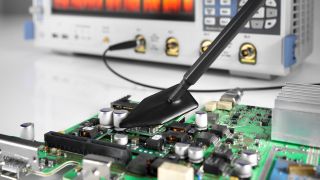Compliance with standards assured by the T&M experts who help write them
EMC testing is all about standards. Whether you are developing 5G products, automotive equipment, military equipment or something as simple as an ordinary table lamp, your device – must meet the requirements set by standardization organizations such as IEC, CISPR, ISO, IEEE, CENELEC, ETSI, FCC, ANSI, RTCA or the MIL-STD committee.
Standards are all about committees. Rohde & Schwarz has been providing T&M expertise to EMC standard organizations for more than fifty years; making them insiders for implementing EMC test equipment standards.
Confidence in validity is confidence that measurements are accurate and correctly represent the values of the properties being measured. Detailed knowledge of what is being measured and how it is being measured is essential. As members of standard-defining committees, R&S personnel are leading experts in test requirements, making certain that EMC compliance test requirements are correctly implemented in R&S products.
You can download an overview of the EMC standards and the applicable measurement equipment below.
For more information please contact us.









